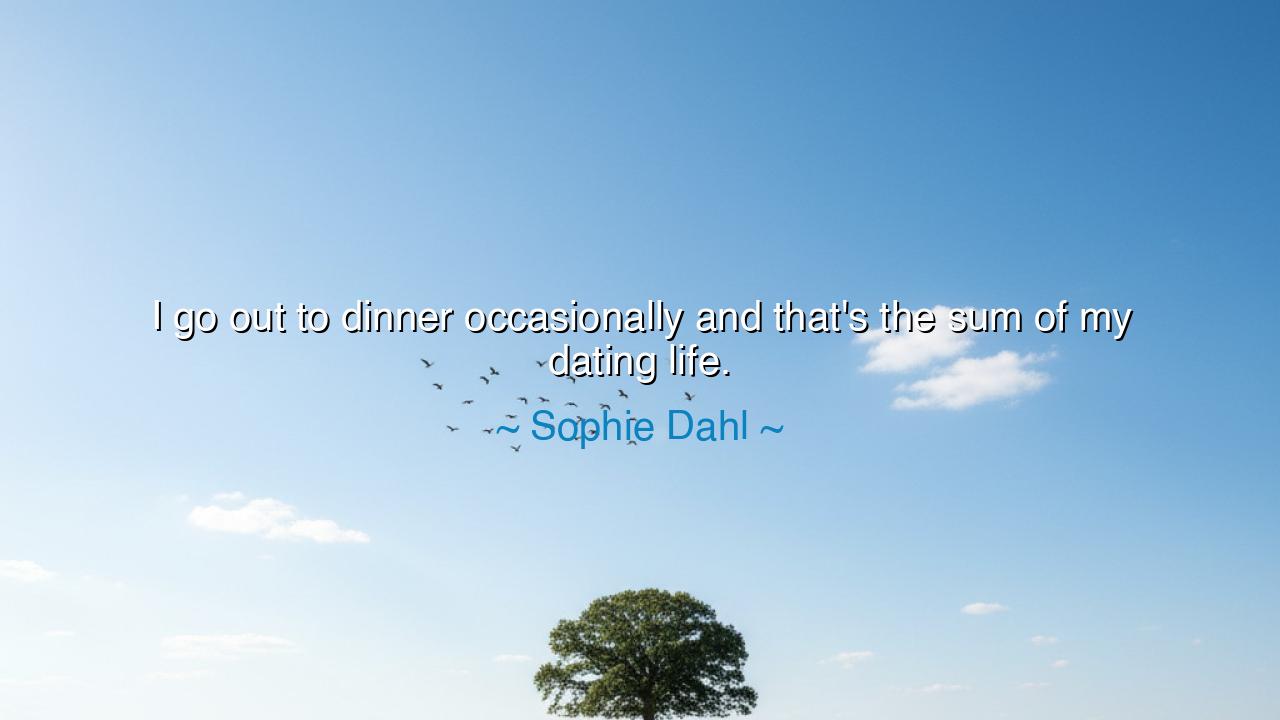
I go out to dinner occasionally and that's the sum of my dating






In a world that trumpets spectacle, Sophie Dahl lowers her voice and draws a small circle on the table: “I go out to dinner occasionally and that’s the sum of my dating life.” The sentence is modest as a candle, yet it illumines a roomful of meanings. She weighs the noisy currencies of romance—grand gestures, endless swipes, fevered pursuit—and chooses a single coin: a shared meal now and then. The ancients would have smiled; for them, love often began not in fanfare but at a humble board, where bread and words were broken together.
Attend to her measure: occasionally—not never, not constantly. The adverb is a gatekeeper, granting passage only to what is worth the crossing. In an era that equates activity with worth, she names a different arithmetic: the sum of a thing is not its volume but its value. A single unhurried supper may carry more reality than a calendar crowded with performance. Thus the dating life becomes less a stadium and more an orchard—few trees, well tended, fruit that actually ripens.
There is also a quiet defiance here. To declare that the sum is supper is to resist the marketplace that would itemize the heart—profiles, algorithms, serial auditions. She refuses the tyranny of escalation. No breathless itinerary, no public “hard launch,” no compulsory drama—only the ancient sacrament of a table, where pace and presence can be read without amplification. What is small to the crowd may be sufficient to the soul.
Consider a mirror from history. Emily Dickinson, mistress of the interior life, made of brief encounters and long letters a cosmos of felt meaning. She did not promenade through drawing rooms to prove her desirability; instead, she curated scarcity, and in scarcity found depth. While her path was singular, the lesson is general: intimacy is not guaranteed by frequency. A few appointments—kept with seriousness and attention—can do more than a season of frenzied appearances. “Enough” is a spiritual category before it is a numerical one.
The dinner table also restores proportionality. There, the ordinary is honored—how someone listens, how they treat the server, how they adjust to a moment gone awry. Grandeur hides flaws; soup reveals them. The ancients trusted the meal to disclose character: Odysseus was tested by hospitality long before he reclaimed a throne. So too a modern heart may learn in one simple evening what a month of curated photos cannot teach.
From Dahl’s line we draw a clear lesson: define your dating life by the depth you desire, not the noise you fear missing. Let your standard be meaningful cadence, not relentless motion. When asked to expand your calendar, first expand your attention; when urged to scale your search, refine your taste instead. The sum of your love story will not be counted in nights out, but in the integrity of the moments you refuse to dilute.
Practical rites for the pilgrim of quiet courtship: (1) Choose fewer dinners, longer ones; protect three unhurried hours. (2) Pick places that invite conversation over spectacle—soft light, modest music, honest food. (3) Bring three questions that test fit (values, rhythms, repair), and answer them yourself without performance. (4) End every evening with a short inventory: Did I feel more myself or less? Was curiosity mutual? Is there warmth without rush? (5) Let occasionally be a boundary you keep, so desire remains discerning and rest remains intact. Do this, and you will discover that a life measured in well-chosen meals can be rich indeed—small on the ledger, abundant in the heart.






AAdministratorAdministrator
Welcome, honored guests. Please leave a comment, we will respond soon